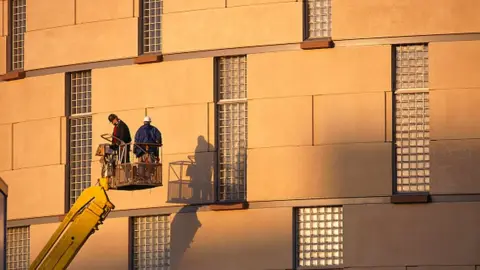Cladding red tape 'stops people selling homes'
 Getty Images
Getty ImagesYoung and vulnerable people are stuck with homes they can't sell because of red tape around cladding, a leaseholders' charity says.
Many high-street lenders ask for an EWS1 form as proof that cladding is safe but leaseholders say they are struggling to get hold of the form.
The Leasehold Knowledge Partnership says cladding problems have blocked tens of thousands of flat sales.
The government says the forms are often not needed for low-rise buildings.
After 72 people died in the Grenfell Tower fire in 2017, the government pledged safe alternatives to dangerous cladding would be provided on all buildings taller than 18m by June this year.
But the public accounts committee says only 155 out of 455 high-rise buildings with similar cladding to Grenfell have had it replaced.
A new target to complete the work has been set for the end of 2021 but the committee of MPs says the delay has resulted in thousands of people being "condemned to lives of stress and fear".

Valeria Martorelli bought her shared ownership flat in a low-rise block in London two years ago, aged 26.
She owns 35% of it, with a housing association owning the rest.
When she put the flat on the market after getting a new job in Belfast, she was told lenders would need to see an EWS1 form in order to give buyers a mortgage.
But the managing agents of her block said they could not get the work required to make the cladding safe for "up to five years".
She told Radio 1 Newsbeat: "I had five buyers interested none of them are going ahead.
"I just hope someone will step in."
Banks said the type of cladding on her building could be dangerous, despite it only being built in 2007.
Without further inspection it's difficult to know how much work is needed and Valeria is worried the cost of fixing the cladding will be more than the proportion of the flat she owns.
UK Finance, who represent the banks, are keen to point out that the form itself is not blocking flat sales and the situation would not disappear without it.
A spokesperson said: "It's rather the fact that the buildings have combustible cladding or walls of unknown make-up.
"Fundamentally we don't know if these properties are safe or not."

The Building Safety Act is a new set of laws being discussed, which the government hopes will prevent future cladding problems and fix current ones.
Yet campaigners are concerned too much money is being asked of the leaseholders, who often, like Valeria only own part of the flat.
"I would lose all of my £30,000 deposit to get rid [of the flat]" she says, "if I could I would do it today".
She says her only hope is a cash buyer but they are offering much less than she paid.
"Cash buyers are investors and they always want to get a bargain.
"But now because they know of the cladding issues, they offer even less, as they know we are desperate and they want to exploit this desperation".
Strict rules are in place about the sale of shared ownership properties, unrelated to the cladding issue.
There are reportedly only 291 people who are qualified to carry out the tests needed for the EWS1 form.
But the government department responsible for housing told Newsbeat that claims around who needs one have become "misleading".
An Ministry of Housing Communities and Local Government spokesman said: "We know many leaseholders are being asked for EWS1 forms when they shouldn't be - if buildings are under 18m or without cladding, an EWS1 should not be necessary."
The government wants lenders to accept other evidence that a building is safe, saying they are: "looking at what else we can do to support leaseholders who find themselves in this situation".
The Leasehold Knowledge Partnership estimates there are 2.8m flats in England and Wales that need some form of confirmation that they are safe.
"A quarter of leaseholders sales are falling through due to cladding" says Martin Boyd from the charity.
"Covid has simply made what was a bad situation more difficult as the pressures of moving financially increase".
He says many of the people affected are first time buyers or in shared ownership schemes, who are now stuck with huge fees to fix the problems in their buildings.

